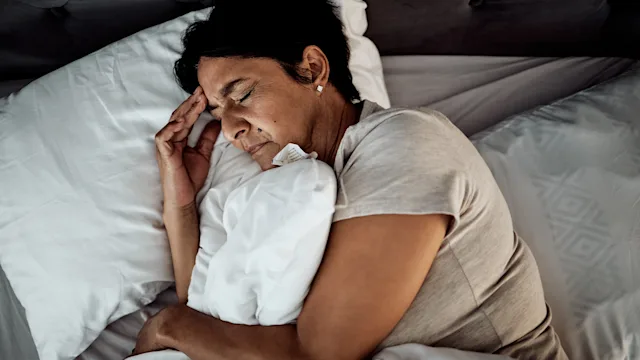Key takeaways:
Getting your sleep schedule to run smoothly starts with consistent sleep and wake times.
Exposure to sun or bright light in the morning can help reset your body’s internal clock.
It can take longer than a week to get back to a normal sleep schedule after a disruption. If your lack of sleep affects your daily life, it may be time to talk to your healthcare provider.
Having trouble with your sleep schedule? It never seems to take much for your sleep to get out of whack. Your sleep schedule can get interrupted for a variety of reasons, like traveling across time zones or staying up late for a couple of nights.
Sleep affects your physical and mental health. That’s why it’s important to get your schedule back to normal. And the good news is, there are several ways you can fix your sleep schedule and get better sleep.
How do you fix your sleep schedule?
If your sleep schedule has gotten wonky, here are some things you can do to get back on track.
Search and compare options
1. Be consistent
Figure out what time you need to get up and then calculate what time you would need to go to bed to get between 7 and 9 hours of sleep. Go to bed at the same time each night and wake up at the same time each morning.
As tempting as it may be to sleep in on the weekends or on vacation, you’re better off sticking to your set sleep and wake times.
2. Get some morning sun
Your body’s sleep-wake cycle runs on something called the circadian clock or circadian rhythm. This built-in clock is sensitive to light. If you expose yourself to sunlight or bright light in the morning, you’re more likely to sleep better at night. Try opening your curtains first thing or going for an early morning walk.
Resetting your circadian clock also gets your melatonin in sync. Melatonin is your body’s sleep hormone. It decreases with the morning light and increases in dim light and darkness.
3. Relax before you go to bed
Think about things that help you wind down. Maybe it’s listening to instrumental music, reading a book, or meditating. Make time to chill before you hit the hay.
Try to avoid using screens like your phone as part of your relaxation routine. And if you choose to watch TV, keep the content light rather than an intense movie or TV show.
Read more like this
Explore these related articles, suggested for readers like you.
4. Create a dark, cool environment
Your bedroom should be reserved for sleep and intimacy. Eliminate distractions like a TV, computer, or bright lights. Put your cell phone away or leave it in another room. The light from electronic devices could mess with your sleep. Avoiding your phone for 30 minutes before bedtime can help you fall asleep faster and stay asleep longer.
5. Watch what you drink
Avoid caffeinated beverages for at least 6 hours before bedtime. The same goes for alcohol. Some people may use alcohol to get back to a regular sleep schedule. But alcohol interferes with sleep cycles and can prevent you from getting good quality sleep.
Also, reduce the amount of fluids you drink before you go to bed. This will reduce the likelihood you need to get up and use the bathroom during the night.
6. Exercise during the day
Being physically active during the day can help you sleep better at night. Moderate to intense workouts seem to affect sleep quality better than light physical activity.
Just don’t engage in vigorous exercise in the evening or right before bedtime. It may interrupt your ability to get good sleep, though the evidence on this isn’t conclusive.
7. Eat earlier in the evening
People who eat an hour or more before bedtime tend to sleep better than those who eat just before they go to bed. Additionally, avoid heavy, spicy meals, which could disrupt your ability to fall asleep.
How long does it take to fix your sleep schedule?
Getting your sleep schedule back to normal won’t happen overnight. It’s going to take time for your body to adjust. If you're looking to get back on schedule, it can take longer than a week to reset your body, so make sure to stay consistent and give it time.
How much sleep do you need every day?
The amount of sleep you get is as important as the quality of your sleep. Most adults should aim for 7 to 9 hours of sleep every night.
When should you talk to a doctor about trouble sleeping?
If you’re unable to reset your sleep schedule after a week or two, it may be time to visit your healthcare provider. This is especially important if lack of sleep is affecting your daily life.
Your provider should be able to run tests or order a sleep study to see if you have an undiagnosed health condition. There are many conditions that can interfere with sleep, like chronic insomnia or sleep apnea.
Your provider can also work with you on a treatment plan that may involve taking medication or melatonin until you start sleeping better. And if you’re diagnosed with sleep apnea, your provider can prescribe a CPAP machine to help you breathe better at night.
Consider keeping a sleep diary a week or two before your appointment. This will give your provider more information about your sleep and how to help.
The bottom line
A sleep schedule that gets out of whack can be frustrating. It can make you feel grumpy and affect your productivity at work and your relationships at home. Fortunately, there are things you can do to reset your shuteye.
Start by going to bed at the same time every night and getting up at the same time every day. Make sure you get plenty of sunlight or bright light first thing in the morning. Watch what you eat and drink in the afternoon and evening. If you have trouble getting back on track after a week or two, talk to your provider. There may be something else going on that could be causing you to lose sleep.

Why trust our experts?



References
American Academy of Sleep Medicine. (2018). Sleep and caffeine.
American Academy of Sleep Medicine. (2020). Healthy sleep habits.
Centers for Disease Control and Prevention. (2022). How much sleep do I need?
Centers for Disease Control and Prevention. (2022). Key sleep disorders.
Centers for Disease Control and Prevention. (2022). Tips for better sleep.
Dolezal, B. A., et al. (2017). Interrelationship between sleep and exercise: A systematic review. Advances in Preventive Medicine.
He, J., et al. (2020). Effect of restricting bedtime mobile phone use on sleep, arousal, mood, and working memory: A randomized pilot trial. PLoS One.
Iao, S. I., et al. (2021). Associations between bedtime eating or drinking, sleep duration and wake after sleep onset: Findings from the American Time Use Survey. British Journal of Nutrition.
Mead, M. N. (2008). Benefits of sunlight: A bright spot for human health. Environmental Health Perspectives.
National Heart, Lung, and Blood Institute. (2022). Insomnia: Diagnosis.
Ochab, J. K., et al. (2021). Observing changes in human functioning during induced sleep deficiency and recovery periods. PLoS One.
Pacheco, D., et al. (2023). Exercise and sleep.
Vasey, C., et al. (2021). Circadian rhythm dysregulation and restoration: The role of melatonin. Nutrients.

















